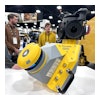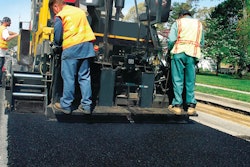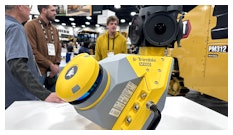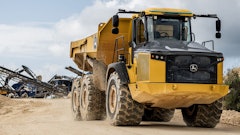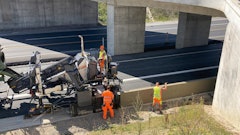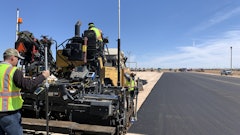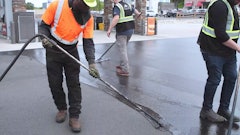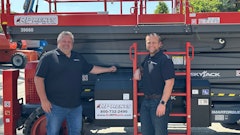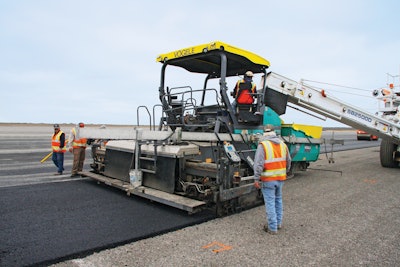
A SUPER 2100-2 replaced the asphalt pavement of the “Vehicle Dynamic Assessment Pad” (VDA Pad) at the Conti Proving Grounds in Uvalde, TX. To ensure totally reliable results in tire tests, the evenness of the pavement had to meet extremely exacting standards. Selecting a high compaction screed for the paving work helped produce a top-quality pavement.
Selected drivers can really put their foot down in Uvalde, TX. A little over 68 miles from the Mexican border, this is the home of the Uvalde Proving Grounds of tire manufacturer Continental Tire the Americas, LLC. Conti’s 4,998 acre site includes 11 different courses for testing its tires in the toughest conditions: a high-speed oval, various asphalt, cement, gravel and mud courses, rocky terrain and numerous special test courses. The climate is ideal for testing purposes, with mild to warm temperatures prevailing year-round in the region.
Conti prefers to produce its own bad weather -- to be precise, the tire manufacturer uses, among other things, its “Vehicle Dynamic Assessment Pad” measuring 645 square feet whose asphalt pavement has now been rehabilitated by a SUPER 2100-2. The pad has a 1 percent slope and can be flooded with water to a depth between 1.3 and 2.8 millimeters. To yield useful findings on tire behavior in wet weather, however, the surface must be absolutely flawless and meet the highest standards as regards evenness and resistance to deformation, for the film of water must have a uniform depth over the entire area with no breaks. It was quite a challenge for contractor Reece Albert, Inc., but one which they mastered effortlessly with technology from Vögele. After all, the company had already worked on the Conti Proving Grounds with its SUPER 2100-2 several times in the past.
Maximum pre-compaction by the paver
The existing pavement was first removed to a depth of about 4.9 inches. Once a spray seal had been applied, the SUPER 2100-2 with an AB 600-2 Extending Screed laid 1.7 inch binder course across a pave width of 14 feet, followed by a wearing course, 1 inch thick, over the same width. To ensure that the mix could be compacted to the particularly high degree of 92 - 97 percent demanded by Conti, the AB 600-2 came in the TP2 version with tamper and two pressure bars. Using high compaction technology with pressure bars driven by pulsed-flow hydraulics, the Vögele screed yields the highest degree of pre-compaction achievable by a paver. This, in turn, lays the basis for durable asphalt pavements resistant to deformation. In Uvalde, the pavement density was tested whenever 551 tons of asphalt had been compacted --and met all the specified requirements.
Maximum evenness required
For this job, evenness was another prime concern for Conti: a deviation of no more than 3 millimeters was permitted over a distance of 9 feet, in both longitudinal and transverse directions. To meet with such stringent requirements, other factors, such as air temperature and the temperature of the mix had to be taken into account. As to machine technology, contractor Reece Albert, Inc. also opted for highest precision, selecting NIVELTRONIC Plus, the Vögele System for Automated Grade and Slope Control. In order to monitor the paving process and ensure a perfect result, the paver was fitted with a Big MultiPlex Ski on the right-hand side to scan the base onto which to lay the asphalt. On the left-hand side, an US ski scanned the already paved strip. In this way, the paving crew was able to ensure that even the slightest deviation from the exacting requirements was instantly detected and corrected.
German technology makes the grade
The result was a tour de force in all respects. Chris Cornell, Business Development Officer at Reece Albert, Inc., was delighted with the German equipment: “The evenness we achieved with VÖGELE High Compaction Technology, in particular, was beyond anything we’ve achieved in the past.” Thanks to this precision, Conti can once again count on highly accurate test results.
